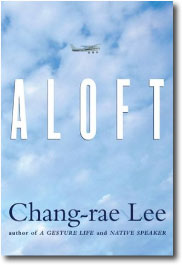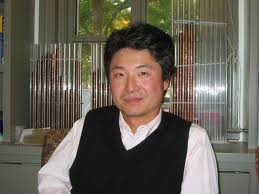“The recurring fantasy of my life (and maybe yours, and yours) is one of perfect continuous travel, this unending hop from one point to another, the pleasures found not in the singular marvels of any destination but in the constancy of serial arrivals and departures, and the comforting companion knowledge that you’ll never quite get intimate enough for any trouble to start brewing, which makes you overflow with a beatific acceptance and love for all manner of humanity.”
Jer ome Battle, who describes himself as an “average American guido,” has managed to live most of his sixty years “above it all,” never quite engaging with those around him or becoming truly intimate. On weekends he is aloft in his small plane, his “private box seat in the world and completely outside of it, too,” flying alone around Long Island. From the air the island “looks pretty magnificent, the late-summer sun casting upon the macadam of the streets a soft, ebonized sheen” and all the trees appearing “ideally formed and arranged, as if fretted over by a persnickety florist god.” None of the “pedestrian sea-level flotsam” of fast-food throwaway containers, cigarette butts, and advertising circulars is visible from the air, and Jerry loves the “scarily, transcendentally life-affirming” thrill of flight.
ome Battle, who describes himself as an “average American guido,” has managed to live most of his sixty years “above it all,” never quite engaging with those around him or becoming truly intimate. On weekends he is aloft in his small plane, his “private box seat in the world and completely outside of it, too,” flying alone around Long Island. From the air the island “looks pretty magnificent, the late-summer sun casting upon the macadam of the streets a soft, ebonized sheen” and all the trees appearing “ideally formed and arranged, as if fretted over by a persnickety florist god.” None of the “pedestrian sea-level flotsam” of fast-food throwaway containers, cigarette butts, and advertising circulars is visible from the air, and Jerry loves the “scarily, transcendentally life-affirming” thrill of flight.
Unfortunately, Jerry also lives his personal life the way he flies his plane, as if he’s seeing it from a great distance. He would like to believe that everything in his life is as perfectly ordered as the Long Island countryside seems to be from the air. Though personal catastrophes are occurring around and to Jerry and his family, any one of which might be enough to unhinge a man more sensitive to his surroundings, Jerry is so disengaged that these events, seen through his eyes, feel like an ordinary part of everyday life-nothing to grab or hold his attention for long. A part-time travel agent, he admits, “I’m one to leap up from the mat to aid all manner of strangers and tourists and other wide-eyed foreigners, but when it comes to loved ones and family I can hardly ungear myself from the La-Z-Boy, and want only succor and happy sufferance in return.”

Slowly, inexorably, the author develops the family’s crises until they finally force themselves onto Jerry’s personal radar screen. A couple of emergencies, he finally realizes, “are new instructions from above (or below or beyond), telling me in no uncertain terms that I cannot stay at altitude much longer, even though I have fuel to burn, that I cannot keep marking this middle distance.” His change of course is a slow turn toward a more involved and connected life, one in which the desultory interactions of family life can provide a kind of satisfaction not visible from “aloft.”
A sensitive and often painful exploration of the human condition, the novel is filled with characters who are utterly isolated at key turning points in their lives, and Lee does not sugarcoat the pain for the reader, even though Jerry himself may not always feel it. The scenes set in the nursing home where Jerry’s father lives are particularly powerful–depictions of a raw, basic need to connect and not be forgotten. Even Jerry observes the quietude among the residents there: “The truth of the matter is they would rather talk to anybody else but their Ivy Acres brethren, wishing to be a part of the chance daily flow again, the messy unknown arrays of people and situations that you and I might consider bothersome or peculiar or annoying but to the institutionally captive are serendipitous events, like finding a ten-dollar bill in the street.”
 Korean-born Chang-Rae Lee is a remarkable writer whose prodigious gifts hide in the background behind Jerry, a main character who is not likable, and who is not someone with whom the reader will feel much, if any, empathy. By placing the focus on character, not plot, and telling the story from Jerry’s point of view, Lee creates enormous challenges for himself. He must engage the reader’s interest in a man who is not really interested in much of anything. Now, at sixty, he has much to atone for very late in his life, and if he is to have any epiphany at all, it must be consistent with his personality at the same time that it is satisfying to the reader, who may be frustrated with his behavior. Yet Lee’s novel is successful, and beautifully written, full of felicitous turns of phrase and penetrating observations. His depictions of Jerry and his family strike chords of recognition as he explores the universal questions of how we become the people we are and how we affect the generations which follow. Subtle in its development, and rich in imagery and obvious symbolism, this quietly complex novel offers evidence that even a man as determined as Jerry Battle to remain above the fray must ultimately connect with the earth.
Korean-born Chang-Rae Lee is a remarkable writer whose prodigious gifts hide in the background behind Jerry, a main character who is not likable, and who is not someone with whom the reader will feel much, if any, empathy. By placing the focus on character, not plot, and telling the story from Jerry’s point of view, Lee creates enormous challenges for himself. He must engage the reader’s interest in a man who is not really interested in much of anything. Now, at sixty, he has much to atone for very late in his life, and if he is to have any epiphany at all, it must be consistent with his personality at the same time that it is satisfying to the reader, who may be frustrated with his behavior. Yet Lee’s novel is successful, and beautifully written, full of felicitous turns of phrase and penetrating observations. His depictions of Jerry and his family strike chords of recognition as he explores the universal questions of how we become the people we are and how we affect the generations which follow. Subtle in its development, and rich in imagery and obvious symbolism, this quietly complex novel offers evidence that even a man as determined as Jerry Battle to remain above the fray must ultimately connect with the earth.
Notes: The author’s photo appears on http://www.cs.princeton.edu
Jerry Battle might have taken this aerial photograph of Long Island, which includes the campus of SUNY Stonybrook. http://www.umc.sunysb.edu
